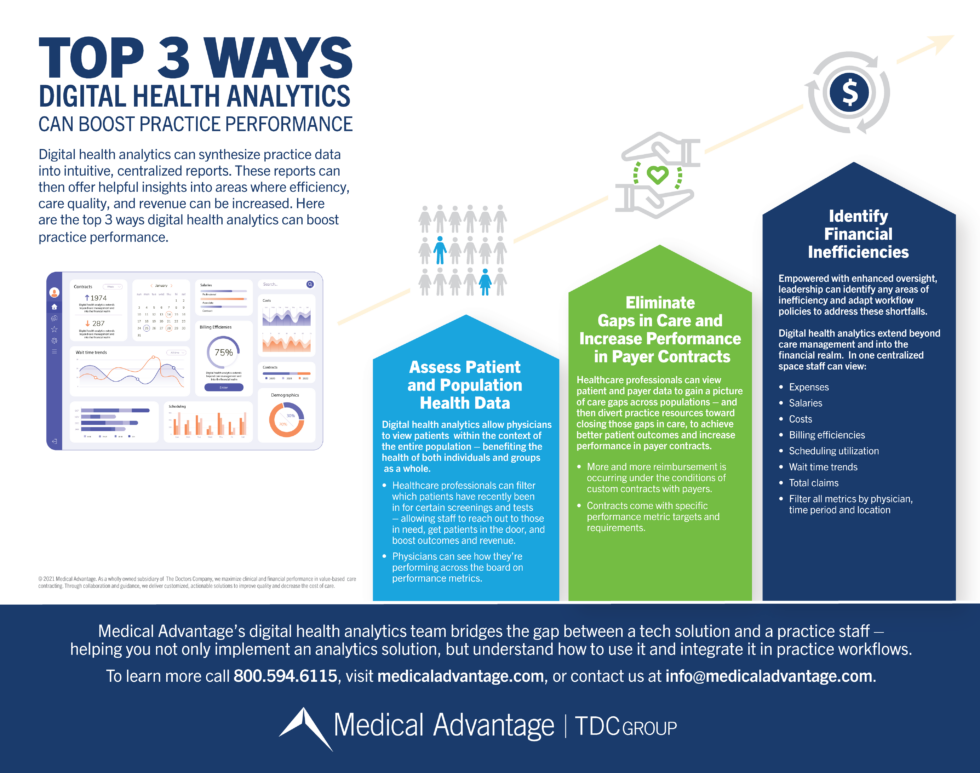In today’s value-based care landscape, digital health analytics are key to any medical practice’s performance, both in care quality and profitability. A robust digital health analytics program can synthesize practice data into intuitive, centralized reports. These reports can then offer helpful insights into areas where efficiency, care quality, and revenue can be increased.
Digital health analytics are important for healthcare entities of all types and sizes, especially those undergoing a change in workflow dynamics. Practices adding practitioners, selling into a larger system, being acquired by private equity groups, or making a change in their EHR provider all know the need for accurate and actionable data about their operation. Analytics can help.
Digital Health Analytics: How They Help
Healthcare today is more data-driven than ever. With a powerful digital health analytics system, care providers will not only spend less time sifting through myriad databases and systems – they’ll also have access to reports giving them deeper insights into their patients and finances. With more time on their hands and more direction as to how they should spend that time, healthcare professionals can focus on better achieving their main mission – providing the best care possible.
But what exactly are the tangible ways analytics help physicians? There are too many to list, but four main benefits of digital health analytics stand out: they can assess population and patient health, help eliminate gaps in care, increase performance in payer contracts, and identify financial inefficiencies on an organization-wide scale.
Benefit #1: Assess Population and Patient Health Data
Up until recently, physicians relied mainly on individual patient’s charts and visits to make sure they were receiving optimum care. While none of that has changed, new digital health analytics tools now allow those same physicians to look at patients within the context of their entire patient population – benefiting the health of both individuals and groups as a whole.
For example, healthcare professionals can apply filters to see which patients have recently been in for certain screenings and tests. This allows them to see how they’re performing across the board on certain performance measurements. It also lets them easily and quickly filter down and see which individual patients are in need of these procedures. Staff can then reach out to get them in the door, boosting outcomes and revenue.
“The practice is patient focused, and it should be. What we do is to help physicians see both the population health level and the individual patient level,” said Jim Stephens, Medical Advantage’s Director of Analytics. “Digital health analytics tell you: here are the patients you should reach out to because they’re due for an annual wellness visit, because they’re do for a cancer screening – so on, and so forth.”
Additionally, with an enhanced understanding of who their patients are and what their patients need, practices can shore up their marketing and engagement efforts to be more effective.
Benefit #2: Eliminate Gaps in Care and Increase Performance in Payer Contracts
While the goal of physicians and healthcare staff – delivering the best care possible to patients – has remained constant over the years, the last decade has seen a dramatic shift in the way practices are reimbursed for that care delivery.
Gone are the days when care providers were simply reimbursed for rendering services to their patients. In today’s value-based healthcare landscape, more and more reimbursement is occurring under the conditions of custom contracts with payers – contracts that come with specific performance metric targets and requirements.
In addition, in a multi-payer system, the rules may vary by payer. Depending on where a practice is located, it may not be out of the question for a practice to have to understand fee schedules and reimbursement policies across 4 or 5 different payers.
With digital health analytics, healthcare professionals can view patient and payer data to gain a picture of care gaps across populations – and then divert practice resources toward closing those gaps in care across your patient population to achieve better patient outcomes and increased payer reimbursements.
“You bring the data together, but more importantly – you generate those insights and those action lists with the understanding that if those things are done, they’ll unlock multiple benefits across payers,” said Stephens. “These digital health analytics are doing the work in the background. Day to day, physicians can remain focused on caring for patients, with the knowledge that this more targeted care will ultimately lead to them reaping the rewards.”
Benefit #3: Identify Financial Inefficiencies
Practice staff well know the frustration of having claims be denied or spending to many days in A/R. Further, inefficient billing and RCM processes, underutilized scheduling and appointment gaps, and variations in performance across multiple locations can also serve as causes for concern.
The benefits of digital health analytics extend beyond just care management and into the financial realm – allowing practice staff and leadership to quickly diagnose and understand these trends. In one centralized space, staff can view expenses, salaries, costs, billing efficiencies, scheduling utilization and wait time trends, total claims and more – and filter all of these metrics by physician, time period, and location.
Think of digital health analytics as a window into your organization’s finances, which can help you identify underlying trends causing financial inefficiencies. Once addressed, your organization will be on its way to enhanced revenue.

Medical Advantage Can Help
The need for accurate and actionable operational is something all healthcare practices and organizations can benefit from. Medical Advantage’s digital health analytics solutions can help. Our expertise in both IT and healthcare bridges the gap between a tech solution and a practice staff – helping you not only implement an analytics solution, but understanding how to use it and integrate it in practice workflows. Our consultants are former healthcare professionals themselves and understand the pain points of practice workflows. We can help you get the most out of your digital health analytics solution.
For more information or to schedule a free consultation, contact one of our consultants today.





